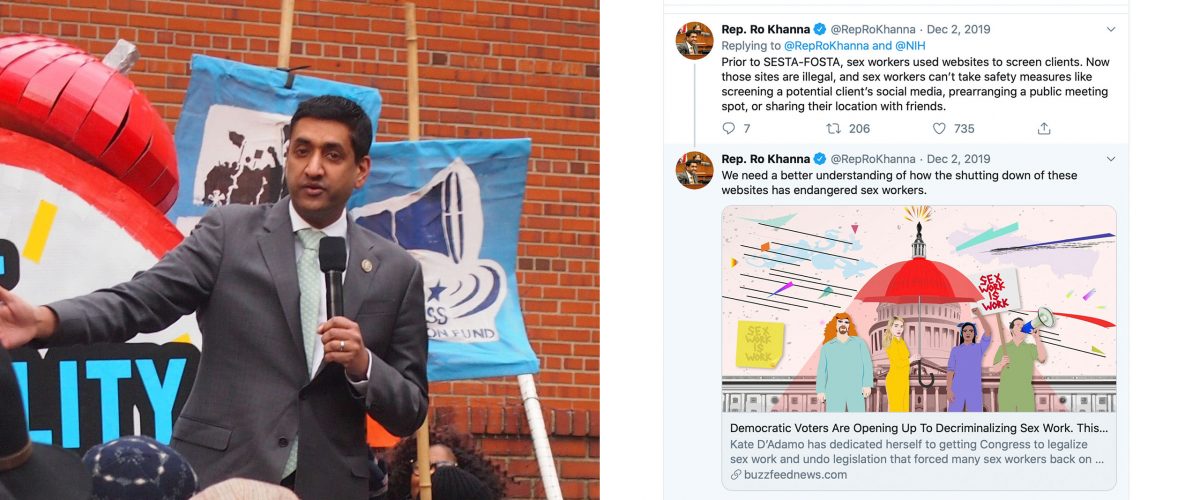As Congress reconvenes for the new year, a specific piece of legislation is expected to be introduced that impacts sex workers via consideration of 2018’s FOSTA/SESTA.
Here is a bit of catch up on the law, as previously reported by YNOT Cam.
The House bill known as FOSTA (Fight Online Sex Trafficking Act) and the Senate bill SESTA (Stop Enabling Sex Traffickers Act) were both “hailed by advocates as a victory for sex trafficking victims” — while also poking a huge hole in a famous and longstanding “safe harbor” rule of the internet: Section 230 of 1996’s Communications Decency Act.
Section 230 said that, “No provider or user of an interactive computer service shall be treated as the publisher or speaker of any information provided by another information content provider.” FOSTA-SESTA came in and created an exception, however, that stated that website publishers would be responsible if third parties were posting ads for prostitution — including consensual sex work — on their platforms.
So now, FOSTA/SESTA holds websites accountable for sex trafficking done on any site, as well as any and all sex work that occurs on a platform. Though sex trafficking and sex work are wildly different, many websites have banned sex work or promotion altogether. It’s a big reason why platforms like Tumblr suddenly began kicking sex workers off of a place where they once had an established base or why bots and mods crawl platforms with chat functions looking for language that may indicate a sex work exchange (even fantasy).
So, as you can see, FOSTA/SESTA started out one way. But, by the time it was signed into law, it didn’t differentiate sex trafficking from sex work. And — spoiler alert — these are two very different things that have everything to do with consent.
FOSTA/SESTA has resulted in an outright ban on all forms of sex advertisement (consensual or otherwise) and has criminalized websites and ISPs for running in sex ads.
Activists raised concerns that the new legislation would endanger sex workers, specifically prostitutes and escorts, because it forces workers into the streets to find clients without a vetting process. And, as far as those in the know within the community can tell, this is exactly what has happened.
The powers that be, however, will never believe or take seriously informed voices coming from within a community (not just sex workers) over a Study or something done via Data. Luckily/”luckily,” Democratic Representative Ro Khanna recently said he’ll be introducing legislation to study the law and how it has impacted sex workers so far.
A study of sex workers coming from government — Is this a good thing?
We reached out to Maxine Doogan, who heads the Erotic Service Provider Legal, Educational and Research (ESPLER) Project, a “diverse community-based erotic service provider led group which seeks to empower the erotic community and advance sexual privacy rights through legal advocacy, education, and research.” We asked Doogan about what she thought about Khanna’s study idea, among other things.
—
YNOT Cam: You mentioned you worked with Rep. Khanna to draft the bill to study the impact. Did you have a specific role in that?
Maxine Doogan: Well, we saw that they were going to be drafting something, so we contacted their office and they let us look over the bill and make some suggestions. [ESPLER is] doing a lot of education about the [sex] industry.
A lot of legislators have only ever been contacted by the “antis,” so the only information [lawmakers] have about the industry is that perspective and… they need more perspectives from actual workers, people who are actually working in the business who can articulate what the situation is. And I think that my input always provides a historic perspective because I’d been working in this business for so long.
So from what you’ve seen, how does FOSTA/SESTA prostitution and sex work in general?
It’s just been very difficult to not have access to internet advertising. Advertising in general with the [sex] industry has shifted to the internet.
We went through all this censorship with the yellow page ads back in the day too, where the vice cops would contact the yellow pages and tell them our ads were for prostitution, which was illegal and that they shouldn’t take our money.
Do you know how the upcoming bill will propose to conduct the study — because the bill is supposed to study the effects, right?
I don’t know how it’s going to actually work. Hopefully when they get the moneys allocated, they will reach out to our communities and do some participatory research that has to do with having people in our industry actually help craft the survey so that it’s relevant to our community.
You want actual [sex] workers participating in that, not people that imagine how our industry works. People who’ve been around, who know some of the ins and outs of the industry. So we’re hoping that once they get the money’s allocated, they will reach out to us.
And before we end this conversation, is there anything else that you’d want to say?
I just think that the legislation, that FOSTA/SESTA, had long-reaching effects. And I hope that the study is able to capture all the harm that it did to all the other types of sub-communities.
I will be introducing a bill calling on the @NIH to conduct a study assessing the way #SESTA–#FOSTA has impacted the health and safety of sex workers
Why? The law was supposed to prevent online sex trafficking, but instead criminalized online sex work and suppressed free speech.
— Rep. Ro Khanna (@RepRoKhanna) December 2, 2019
—
Ariane Torres is a writer who says funny things on occasion. Email her at ariane@ynotcam.com and find her on Twitter at @tofulumpia.
Image of Rep. Khanna via Creative Commons.








